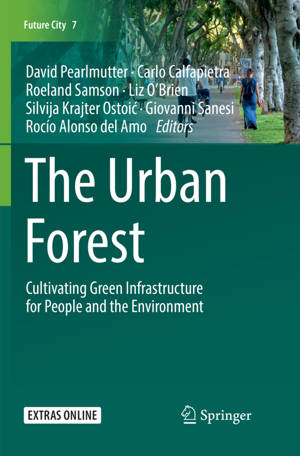
Je cadeautjes zeker op tijd in huis hebben voor de feestdagen? Kom langs in onze winkels en vind het perfecte geschenk!
- Afhalen na 1 uur in een winkel met voorraad
- Gratis thuislevering in België vanaf € 30
- Ruim aanbod met 7 miljoen producten
Je cadeautjes zeker op tijd in huis hebben voor de feestdagen? Kom langs in onze winkels en vind het perfecte geschenk!
- Afhalen na 1 uur in een winkel met voorraad
- Gratis thuislevering in België vanaf € 30
- Ruim aanbod met 7 miljoen producten
Zoeken
The Urban Forest
Cultivating Green Infrastructure for People and the Environment
€ 208,45
+ 416 punten
Omschrijving
This book focuses on urban "green infrastructure" - the interconnected web of vegetated spaces like street trees, parks and peri-urban forests that provide essential ecosystem services in cities. The green infrastructure approach embodies the idea that these services, such as storm-water runoff control, pollutant filtration and amenities for outdoor recreation, are just as vital for a modern city as those provided by any other type of infrastructure. Ensuring that these ecosystem services are indeed delivered in an equitable and sustainable way requires knowledge of the physical attributes of trees and urban green spaces, tools for coping with the complex social and cultural dynamics, and an understanding of how these factors can be integrated in better governance practices. By conveying the findings and recommendations of COST Action FP1204 GreenInUrbs, this volume summarizes the collaborative efforts of researchers and practitioners from across Europe to address these challenges.
Specificaties
Betrokkenen
- Uitgeverij:
Inhoud
- Aantal bladzijden:
- 351
- Taal:
- Engels
- Reeks:
- Reeksnummer:
- nr. 7
Eigenschappen
- Productcode (EAN):
- 9783319843650
- Verschijningsdatum:
- 7/08/2018
- Uitvoering:
- Paperback
- Formaat:
- Trade paperback (VS)
- Afmetingen:
- 155 mm x 235 mm
- Gewicht:
- 780 g

Alleen bij Standaard Boekhandel
+ 416 punten op je klantenkaart van Standaard Boekhandel
Beoordelingen
We publiceren alleen reviews die voldoen aan de voorwaarden voor reviews. Bekijk onze voorwaarden voor reviews.








